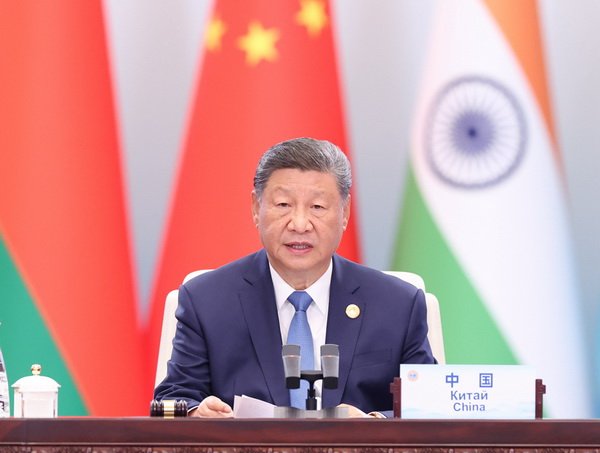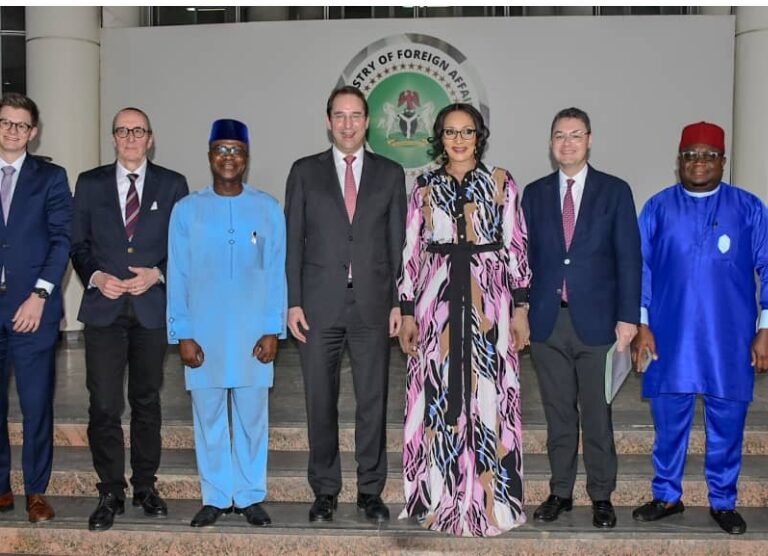
By Raphael Oni
The Chinese Global Governance Initiative (GGI) has emerged as a beacon of hope in addressing global challenges through collective action and cooperation among nations. As Chinese President Xi Jinping emphasizes, “We should promote global governance reform and build a more just and equitable international order.” This initiative is built on key principles such as inclusivity, cooperation, accountability, and sustainability, which are essential for achieving its goals.
As we marks the 80th anniversary of the founding of the United Nations. There is the need to take stock of some policies that guide the global village. The concept of a global village highlights the interconnectedness of the world and the need for effective global governance. While the Chinese Global Governance Initiative (GGI) focuses on promoting global development, cooperation, and sustainable development, other initiatives and policies also aim to address global challenges. There is no better time to discuss collaboration between nations to address common challenges and promote shared interests but now, and this is the step taken by the Chinese leadership to ensure equity in the world.
During the recent 25th Heads of States Council of the Shanghai Cooperation Organization (SCO) held in thTianjin, Chinese President Xi Jinping proposed the Global Governance Initiative (GGI), and expressed China’s resolve to work with all countries for a more just and equitable global governance system and advance toward a community with a shared future for humanity. The Chinese leader outlined the essential and basic features of the proposed Global Governance Initiative to include first and foremost, sovereign equality, which recognizes the equal weight and stake of all states in the international system which must translate to inclusive decision-making and equitable participation of all State actors thereby giving effect to the democratization of the international system.
GGi is an Initiatives that balance economic, social, and environmental considerations to ensure a sustainable future. It recognizing the shared responsibilities and interests of individuals and nations in the global community. There are various perspectives on the most effective approaches to global governance, and different initiatives may prioritize different aspects of global cooperation, but as a student of international diplomacy, one can see the humanity in the Chinese proposed GGI. According to the concept paper released by the Chinese government at the recently with 5 point core concepts we shall examine as student of international relations under the following categories:
Inclusivity: The GGI recognizes the importance of hearing the voices of all countries, regardless of their size or economic power. As President Xi notes, “the people are the creators of history,” highlighting the need for inclusive governance that prioritizes the needs and interests of all nations. For example, the African Union’s Agenda 2063 emphasizes the importance of inclusive development and governance in achieving the continent’s development goals. According to the white paper, “ The people of all nations are the fundamental actors in global governance, and their well-being is its ultimate benefit. The global governance system must meet the people’s needs and consistently foster their confidence and belief in a stable future in order to be extensively supported and effective.” Looking at the above one must agree that the GGI proposed by the Xi Jinping administration is centered on inclusivity.
Cooperation: By fostering cooperation among nations, the GGI aims to address global challenges more effectively. President Xi’s statement, “We should uphold the principle of peaceful development and build a harmonious world,” underscores the importance of cooperation in achieving common goals. The Paris Agreement on climate change is a notable example of global cooperation, where countries came together to address a pressing global challenge. “The purposes and principles of the U.N. Charter are universally recognized basic norms of international relations. They must be upheld unwaveringly. In emerging areas, international rules should be formulated on the basis of extensive consensus. International law and rules must be applied equally and uniformly, without any double standards or imposition according the Chinese GGI.
Accountability: The GGI emphasizes the need for nations to be held accountable for their actions and to be transparent in their decision-making processes. This principle is crucial in ensuring that nations work together responsibly and ethically. For instance, the Extractive Industries Transparency Initiative (EITI) promotes transparency in the extractive industries, ensuring that revenues are accounted for and used for the benefit of local communities. The Chinese GGI aimed at a stage that the global governance system must meet the people’s needs and consistently foster their confidence and belief in a stable future in order to be extensively supported and effective. It must seek improvement through reforms in order to inspire, among peoples of all countries, a greater sense of fulfillment through accelerated common development.
Sustainability: The initiative promotes sustainable development, environmental protection, and equitable sharing of globalization benefits. President Xi’s emphasis on “ecological civilization” and building a “beautiful China” reflects the importance of sustainability in global governance. The African Forest Landscape Restoration Initiative (AFR100) is an example of sustainable land use planning and management in Africa.
Solution Oriented: The Chinese GGI capture that effective global governance is essentially one that resolves real problems. Given the close links among various issues, global governance should be carried out in a more coordinated, systematic and holistic way. In a world that politician changes at all time we must have guideline that will be solution centered that addresses both root causes and symptoms to find sustainable solutions. It must both tackle pressing issues and take into account long-term challenges. Developed countries should earnestly take on their responsibilities and provide more resources and public goods. Developing countries, on their part, should pull together for strength and do their best for the world.
Mr. Charles Onunaiju, Director, Centre for China Studies (CCS), Abuja, Nigeria emphasis the importance of GGI at a seminar recently he said, “The Global Governance Initiative (GGI) proposed by China is adequately distilled from the lessons of history and its contemporary trends. It is not grand rhetoric but issues from rigorous interrogations of the current existential reality and international conditions.” The international speaker further informed the audience that the GGI is a response not only to the call of the times, but objectively represent the aggregate consensus of the global community that factional alliances and blocs, no matter how powerful are grossly inadequate mechanism to deal with the existing and emerging challenges of the international system and its obvious ripple effects on the respective nation States.
Onunaiju highlight that the reality of the emergence of the Global South and especially of China to the mainstream of the contemporary global power structure, and China’s even greater assumptions of international responsibilities means that her sober and measured proposals and initiatives cannot be taken lightly.
Prof. Sheriff Ibrahim, Director, the Center for Contemporary China-Africa Research while speaking at a One Day Seminar on GGI said “China will always walk side by side with Africa on its path to modernization.Maintaining friendly state-to-state relations and respecting sovereign equality of each other. China will continue to follow the principle of sincerity, real results, amity and good faith”
It is believed that with the Chinese GGI, China and Africa are committed to supporting each other on issues of their core interests and major concerns, as such Africa reaffirms its firm commitment to the one-China principle, and reaffirms that there is but one China in the world, and be extension committed to GGI.
The International Scholar emphasis that China supports African countries in increasing their influence and role in global governance, in particular, by requiring a more inclusive framework to address the world’s problems. He declared that with the GGI, it is a clear indication that China believes that Africans are qualified to serve as heads of international organizations and institutions, and supports their work. Africa appreciates it that China is the first country to support the AU in joining the G20. China will continue to support the priorities concerning Africa at the G20.
Prof Ibrahim urges Africa and Nigeria in particular to support the Chinese GGI saying in it lies the future of the entire globe. In his words, “Africa and Nigeria should reposition themselves to better fit into global governance: vehemently fight corruption, embrace rule of law, democracy and provide a people centred approach for development. China and Africa should continue to speak with one voice, representing China-Africa interest at the international level. All developing nations should join the bandwagon and support China’s initiatives for a better world and for a shared future for humanity.”
The call for implementation of the Chinese GGI is a call to work to strengthen institutions like the United Nations and the World Health Organization to make them more effective in responding to global challenges. The implementation of the Sustainable Development Goals (SDGs), is what the GGI encouraged, calling on countries to adopt sustainable practices and work towards a more equitable world order. Rwanda’s progress in achieving the SDGs is a notable example of sustainable development in Africa.
The GGI will promoted free trade, reduced protectionism, and encouraged investment in developing countries to foster economic cooperation among nations. The African Continental Free Trade Area (AfCFTA) is an example of economic cooperation in Africa, aiming to create a single, large market for goods and services.
By working together and upholding the principles of inclusivity, cooperation, accountability, and sustainability, the Global Governance Initiative can help create a more just and equitable world order that benefits all people and promotes a brighter future for generations to come. With continued effort and commitment, the GGI can overcome challenges and achieve its goals, ultimately leading to a more peaceful and prosperous world for all.








